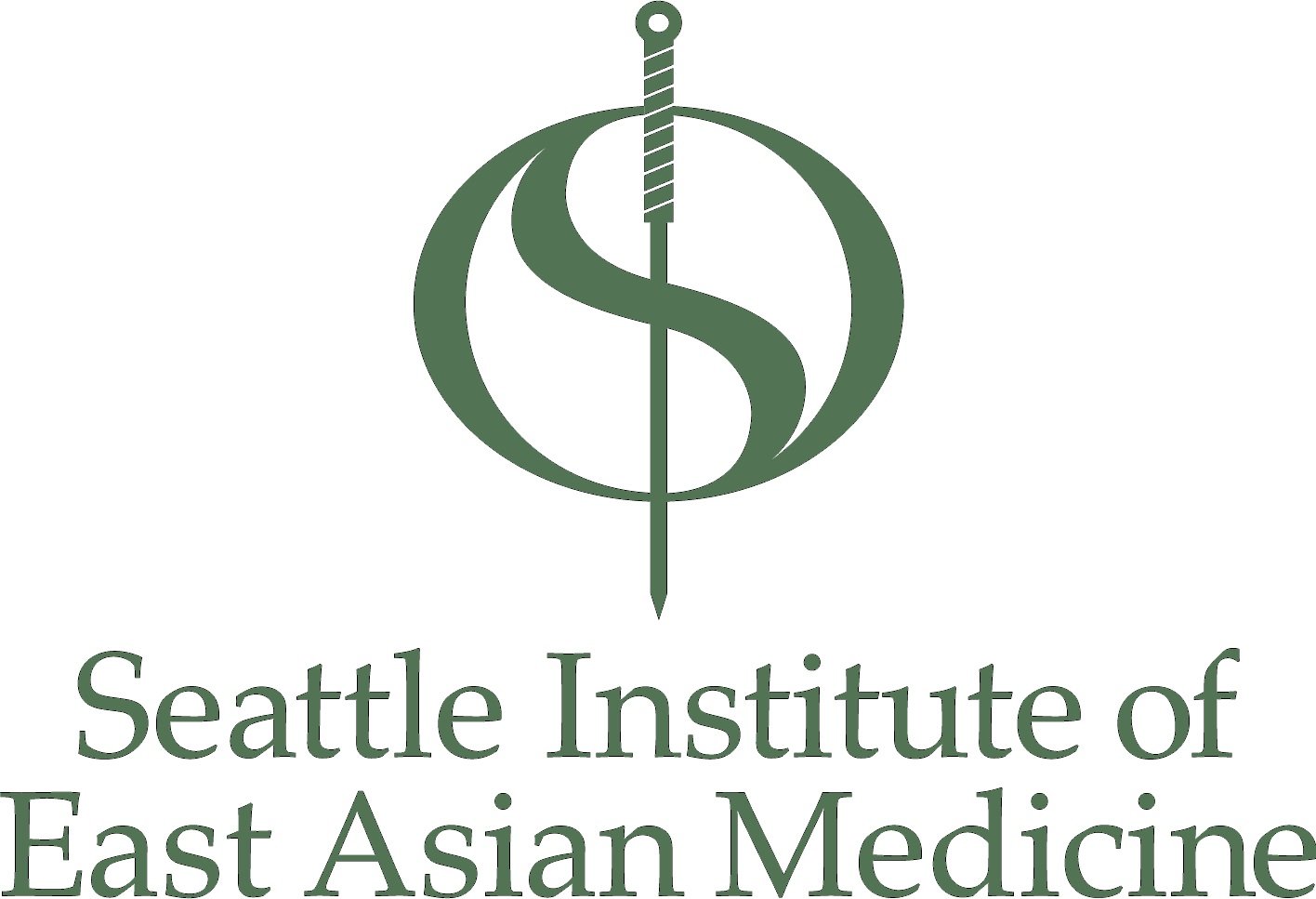Masters of Acupuncture &
Herbal Medicine
Overview
The Masters of Acupuncture and Herbal Medicine (MAcHM) degree is a full-time, three-year program. After three years, students graduate from the MAcHM program and have the option to complete a fourth year of study to graduate with the Doctorate of Acupuncture and Herbal Medicine (DAcHM) degree.
This is an overview of the first three years of the MAcHM program. For more details, check out the SIEAM Programs Catalogue. To learn about the fourth year of study, visit the DAcHM degree description.
Location
Main Campus Building
SIEAM is based in one main campus building in the Georgetown neighborhood of Seattle. The low-cost student clinic and all in-person classes are held here.
Seattle Institute of East Asian Medicine
6363 7th Avenue South
Seattle, WA, 98108
Externship Clinic Sites
Students have the opportunity to work at a few different clinic locations in the greater Seattle area.
Seattle Acupuncture & Herbs
Neighborcare Health at 45th Street
Asian Counseling and Referral Services
Pike Market Senior Center
Small Class Sizes
Students are in cohorts, or small classes. Each year in September, a new cohort of students start their first year. In the history of SIEAM, the smallest cohort was three students and the largest was eighteen.
Students in each cohort take all their classes and clinic shifts together. They practice doing bodywork and needling their first acupuncture points with each other, so they become close quickly. The student culture at SIEAM is relatively supportive and noncompetitive. Many students choose to study together and help each other in meaningful ways, like sharing notes and carpooling.
Trimester Schedule
The Master’s schedule is full-time, and SIEAM is on the trimester system. Each trimester is 15 weeks long.
Fall — September to December (15 weeks)
2 Week Break
Winter — January to May (15 weeks)
2 Week Break
Spring — May to August (15 weeks)
3 Week Break
There is no long Summer break.
All classes are taught in-person unless some classes and herb clinics are migrated online for Covid or other safety precautions.
Weekly Schedule
Students are in scheduled class and clinic time for about 25 hours total per week. The estimated amount of time that students spend on studying and homework is about 15-25 hours per week. This adds up to about 40-50 hours per week spent on SIEAM studies total.
The schedule varies by the term. Students receive the schedule for the following term about 6 weeks before the next term starts. Most scheduled class and clinic times fall between 8am-5pm on weekdays, with some weekday evening clinic shifts and 1-2 weekend workshops (9am-5pm) per term.
Here are sample schedules for a Fall term.
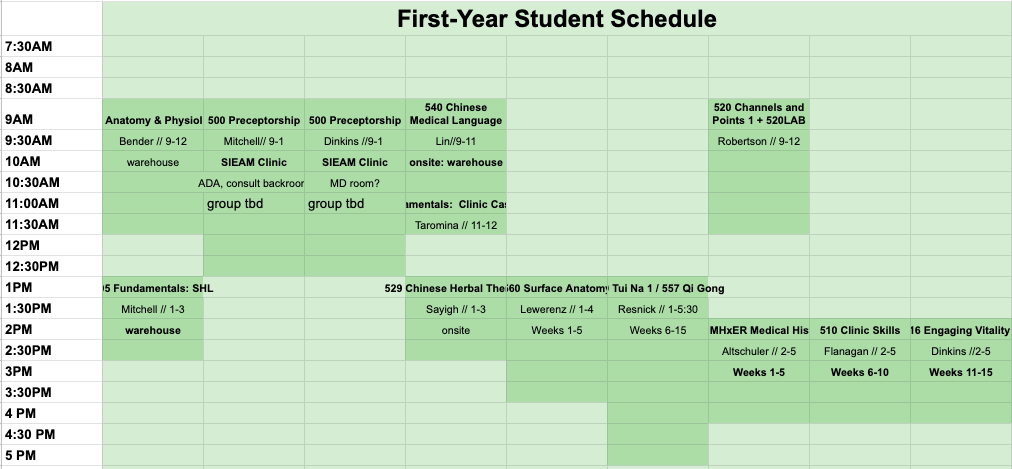
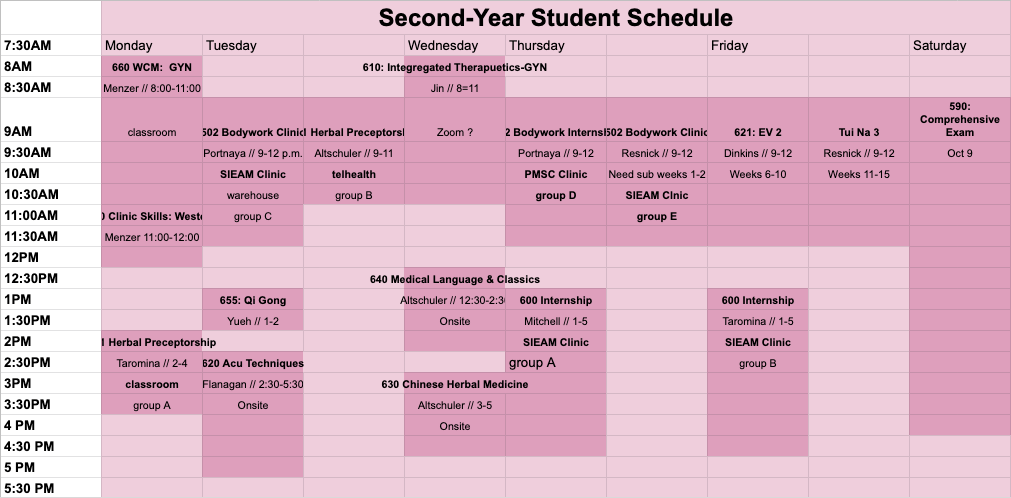
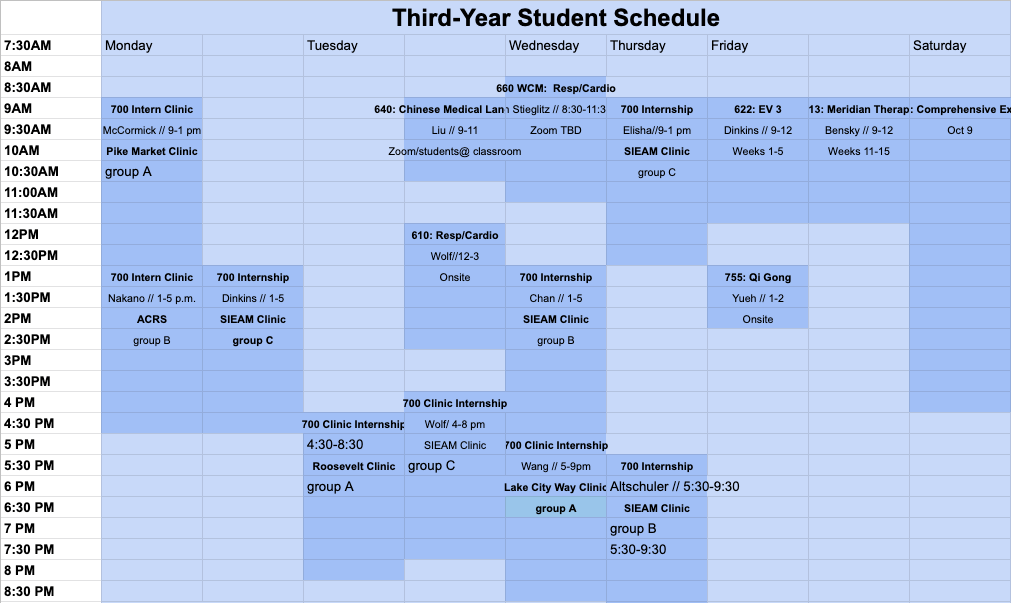
Working During School
Many student choose to work while they’re in the Masters program. Some find it difficult to work while in school and keep up with the curriculum. This depends on the individual student’s circumstances. Students who maintain work during the program often work about 4-8 hours per week at a low-stress job where the schedule can flex around SIEAM’s fixed schedule.
SIEAM has some limited work-study positions for clinic Patient Care Coordinators (PCCs) who help patients check in and out during clinic shifts in SIEAM’s low-cost student clinic at the Georgetown campus building.
Year 1
The first year of instruction focuses on students gaining insights from experienced faculty in clinic and academic instruction, and introducing students to the fundamentals of both classical and contemporary traditions of East Asian medicine.
Clinic — Students have the unique opportunity of preceptoring from the beginning of their first year with experienced SIEAM clinical faculty who represent diverse backgrounds in diagnostic and treatment approaches to patient care.
Courses — There is in-depth instruction in qi gong, physical palpation and assessment techniques; as well as methods of performing acupuncture and related modalities. Surface anatomy and western clinical science provide a groundwork that effectively informs the practice of bodywork and acupuncture. Students study the basics of Chinese herbal therapy and Chinese medical language throughout year one.
For the MAcHM and DAcHM students, this training continues throughout the remaining years of the program to enable them to utilize Chinese herbal formulations and to access Chinese medicine texts.
Year 2
Clinic — All students in the second year participate in clinical practice with acupuncture and related modalities. Student interns practice in a team approach to provide acupuncture, herbal medicine and bodywork under the supervision of key faculty, who have been their mentors in their academic instruction. They will have weekly clinical preceptorship with experienced herbalists on the SIEAM faculty.
Courses — Students also continue to deepen their understanding of the biomedical perspective of diseases in order to more effectively communicate with patients and collaborate with other health care practitioners. Student learning focuses on the technical aspect of techniques and clinical practice and the demonstration of basic skills for assessment, diagnosis, treatment and referral. Students will also participate in rigorous instruction in Chinese herbs, Chinese medical classics, and medical Chinese language. They work in the herbal dispensary learning how to make herbal preparations, measuring herbs for formulations, and becoming cognizant of the safety issues in working with the Chinese materia medica.
Year 3
In the third year of SIEAM programs, the learner engages with the various clinical conditions and diseases commonly seen in contemporary clinics from both eastern and western perspectives.
Clinic — The clinical internships include offsite training assisting patients in community clinics, senior centers, and other specialized patient populations. At this point, interns largely practice “solo”, being responsible for all aspects of patient care with oversight by SIEAM’s clinical supervisors. Students work in integrated clinics combining acupuncture and herbal medicine and have coursework on herbal therapies for the range of clinical conditions likely to be seen in clinical practice.
Courses — Students broaden their understanding of the health care system, its histories, and the legal and business necessities of practicing in the field today. They continue their Chinese language studies through the translation of case studies and texts relevant to the clinical conditions they study.
Total Credits
Here are the total numbers of hours and credits completed in the three-year Masters program.
Academic Instruction — 2220 hours (147 credits)
Clinical Training — 1275 hours (42.5 credits)
Program Total — 3495 hours (189.5 credits)
Accreditation
Seattle Institute of East Asian Medicine and its following programs are accredited by the Accreditation Commission for Acupuncture and Herbal Medicine (ACAHM):
(1) Master of Acupuncture with a Chinese herbal medicine specialization
(2) Doctor of Acupuncture with a Chinese herbal medicine specialization
including a Doctor of Acupuncture with a Chinese herbal medicine specialization degree completion track
The programs listed above may offer courses via distance education.
ACAHM does not accredit any programs at the undergraduate/bachelor level.
The certificate program in Asian Medical Bodywork offered by SIEAM is approved to begin enrolling students but is not accredited by ACAHM. This program is eligible for ACAHM accreditation, and SIEAM is currently in the process of seeking ACAHM accreditation for the program. However, SIEAM can provide no assurance that accreditation will be granted by ACAHM. Graduates of an unaccredited program are not considered to have graduated from an ACAHM-accredited program and may not rely on ACAHM accreditation for professional licensure or other purposes.
Accreditation status and notes may be viewed on the ACAHM Directory.
ACAHM is recognized by the United State Department of Education as the specialized accreditation agency for institutions/programs preparing acupuncture practitioners. ACAHM is located at 500 Lake Street, Suite 204, Excelsior, Minnesota 55331; phone 952/212-2434; https://acahm.org.
Public Disclosure Statement Effective as of 13 August 2025.
What makes SIEAM unique?
The Masters program at SIEAM is designed with the patient in mind every step of the way. Read about six cornerstones of SIEAM’s educational model that prepare the next generation of practitioners to provide excellent care.
Our Philosophy
Clinical Training
Small Cohorts
Exposure to Variety
Medical Chinese
Qi Gong
“I believe that SIEAM does its best by facilitating students to invest themselves in this medicine, giving them the tenacity and resources they need to be resilient in their subsequent career.”
Abroad
SIEAM does not have any study abroad programs at this time. However, some SIEAM faculty visit local and international communities regularly to provide care.
After Graduation
What do students do with their degrees?
Start a private practice.
Work at a small bodywork clinic.
Work in a mainstream hospital.
If you’re strongly considering working in a mainstream hospital, check out the doctorate program.Make an herbal product line.
Highlight! Check out SIEAM graduate Gabi Masek’s herbal products.Teach qi gong.
Educate.
Write and translate.
Provide other public health services.
Work on a cruise ship.
Volunteer locally.
Volunteer abroad.
Highlight! Check out this program started by SIEAM graduate Grainne McKeone.
Tuition
Students are eligible to receive financial aid loans for all SIEAM programs. To see specific tuition rates, visit Tuition & Financial Aid page.
Admissions
Keep Exploring
Learn more about SIEAM’s programs!
What’s in the Program Catalog?
Course Descriptions
Faculty Biographies
Tuition Details
Academic Calendar
…and more!
The doctorate program is…
Highly individualized.
Designed exclusively for SIEAM Master’s graduates.
One year of specialized study in your area of interest.
